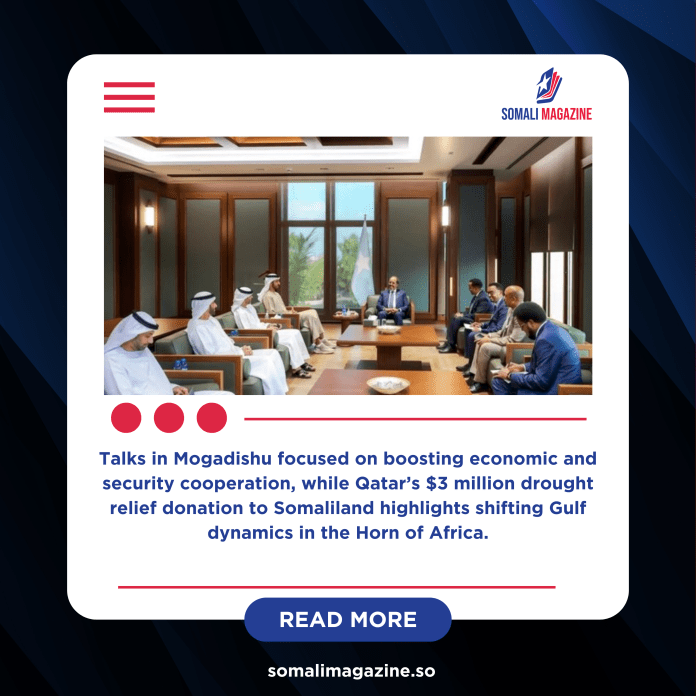Facebook Twitter (X) Instagram Somali Magazine - People's Magazine
Somali President Hassan Sheikh Mohamud held talks on Wednesday with Sheikh Shakhboot Nahyan Al Nahyan, the United Arab Emirates’ (UAE) Minister of State for Foreign Affairs, to discuss closer ties between the two countries.
The meeting took place at the presidential palace in Mogadishu, where the two leaders focused on ways to expand cooperation in areas such as the economy and security. According to Somali government officials, Sheikh Shakhboot delivered a personal message from UAE President Sheikh Mohamed bin Zayed Al Nahyan, reaffirming Abu Dhabi’s commitment to supporting Somalia.
In response, President Mohamud expressed gratitude for the UAE’s ongoing assistance. He also emphasized Somalia’s readiness to strengthen its partnership with the Gulf nation while pushing forward with national goals of peace, democratization, and development.
The UAE has long played a key role in Somalia’s recovery efforts, from providing humanitarian aid to investing in critical infrastructure. Both sides view stronger ties as essential for stability in the Horn of Africa, a region that continues to face challenges such as insecurity, drought, and economic hardship.
While Somalia deepened its relations with the UAE, neighboring Somaliland also drew attention on the same day with an announcement of emergency support from Qatar. Somaliland, which has experienced a devastating drought after the failure of spring rains, received a $3 million donation from Doha to support affected communities.
Somaliland’s Minister of Religious Affairs, Abdillahi Dahir Jama Baashe, praised the donation, calling it “a brotherly gesture” during a time of great need. The funds are expected to provide relief for families struggling with food and water shortages across the region.
The aid is notable because Qatar has historically had little direct engagement with Somaliland. The self-declared republic has often aligned itself with the UAE and Saudi Arabia, particularly during the Gulf diplomatic crisis of 2017, when Qatar was accused by its rivals of backing militant groups. Despite political differences, Doha’s donation shows a willingness to engage with Somaliland on humanitarian grounds, a move that could signal a new dynamic in regional relations.
Somaliland’s links with the UAE are especially strong due to a $500 million agreement signed with Dubai-based DP World to expand Berbera Port and modernize key infrastructure, including the airport and the road connecting Berbera to Ethiopia. These projects remain central to Somaliland’s long-term economic ambitions, making the region strategically important to Gulf nations looking to expand their influence in the Horn of Africa.
For Somalia, maintaining balanced ties with Gulf partners remains critical. President Mohamud’s administration has prioritized diplomacy and economic partnerships to help stabilize the country, which continues to rebuild after decades of conflict. The visit by Sheikh Shakhboot underlined the UAE’s role as a long-standing ally, while Qatar’s assistance to Somaliland reflects shifting strategies among Gulf states as they seek greater engagement in the region.
Analysts say these parallel developments highlight the Horn of Africa’s importance in regional politics. With its strategic location along major trade routes, and with both Somalia and Somaliland seeking international partnerships, Gulf nations see opportunities to expand their influence while offering humanitarian and development support.
As Somalia works to secure peace and development at home, partnerships with countries like the UAE will remain vital. At the same time, Qatar’s move to support Somaliland could open new doors for cooperation, even in areas where political recognition is still contested.
Both developments — Mohamud’s meeting with UAE officials and Qatar’s aid to Somaliland — underscore the growing role of Gulf states in shaping the region’s future. Whether through diplomacy, investment, or humanitarian relief, their involvement will continue to have a lasting impact on stability and development in the Horn of Africa.

